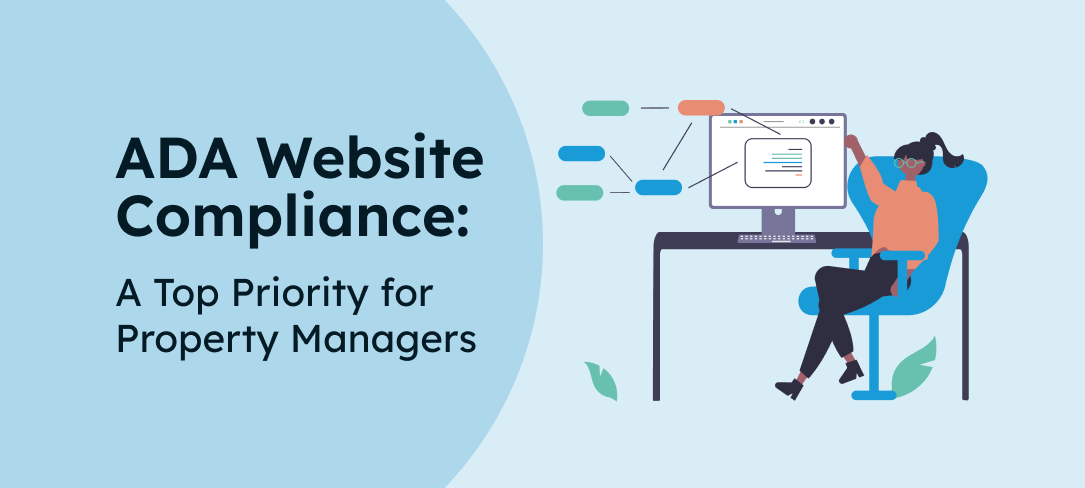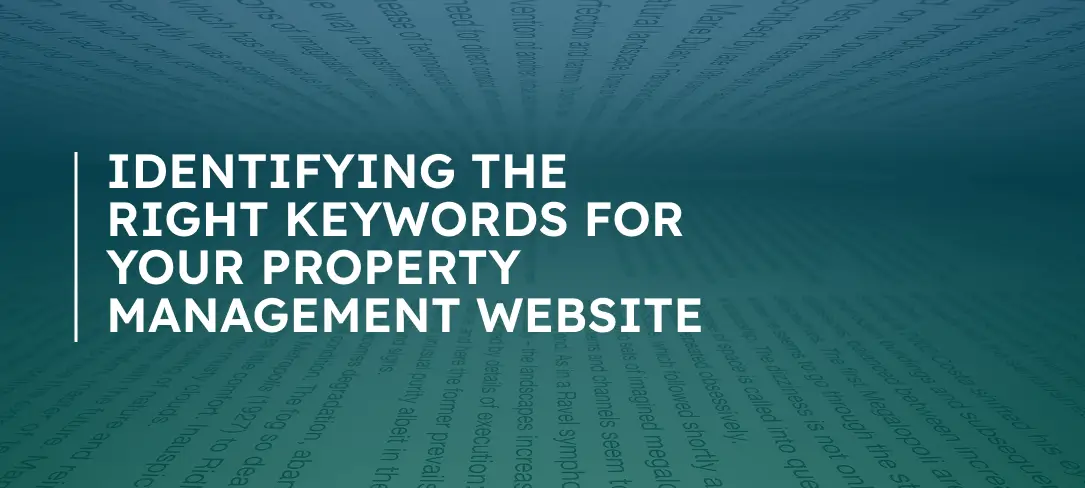Your website is the digital front door to your business. And in 2025, if that door isn’t wide open for everyone, you’re already behind.
ADA website compliance isn’t just a line item in your tech checklist anymore. It’s a legal requirement, a competitive edge, and most importantly, a reflection of your moral responsibility as a property manager.
Website accessibility is no longer about checking boxes. It’s about doing the right thing while keeping your business protected and competitive.
In a world where online leasing, rent payments, and virtual tours are the norm, making your website ADA compliant ensures that people with disabilities aren’t left out. The need is growing, and the expectations are rising.
Keep reading to learn how ADA website compliance is reshaping property management in 2025.
ADA Compliance Is Now Enforced More Strictly
The Americans with Disabilities Act (ADA) and the Rehabilitation Act have long protected the rights of people with disabilities; however, recent updates and legal interpretations from the federal agency are bringing digital accessibility to the forefront.
In April 2024, the Department of Justice issued a final rule updating web accessibility requirements for public-facing websites, including digital properties managed by housing providers. That means:
Any inaccessible web page can now be seen as discriminatory under federal law.
Website owners can face legal action, lawsuits, and legal fees even if the site wasn’t intentionally exclusionary.
Recent court cases have confirmed that websites are public accommodations under the ADA. And yes, property managers are included. It’s not just government agencies being held accountable; it’s businesses across the board.
A single violation can cost tens of thousands of dollars in settlements, not to mention the damage to reputation.
Avoiding these costs is simple: meet the Web Content Accessibility Guidelines (WCAG) and design with accessibility needs in mind.
The Rise of Digital Property Management in 2025
In 2025, property management has become fully digital, with nearly every aspect of the rental process now happening online.
As this shift accelerates, having an ADA website compliance strategy and an accessible website is no longer optional. It’s a key part of meeting tenant expectations and legal standards.
Most tenants expect to:
Apply for housing online
Pay rent via mobile/web
Schedule maintenance through a portal
Tour properties virtually
And sure, all that digital convenience is great, but it only works if everyone can use it. If your site isn’t accessible, you’re creating digital barriers for people who rely on assistive technology like screen reader software or keyboard navigation.
ADA website compliance is about more than avoiding trouble; it’s about creating accessible digital experiences. Everyone deserves a fair shot at using your site, especially renters in the disability community who deserve the same opportunity to fully engage in everyday life.
Serving a Growing Segment: People with Disabilities Are Active Renters and Users
People with disabilities make up a big part of the global population, and they’re active online.
The World Health Organization estimates that over 1.3 billion people worldwide live with a disability.
In the U.S., the CDC reports that 28.7% of adults—more than 1 in 4—live with a disability.
That’s not a niche audience. That’s a major part of your potential renter pool.
Whether someone is visually impaired, has mobility challenges, or processes information differently, they rely on accessibility features like alt text, screen readers, and keyboard-friendly design to browse and apply. If your website's layout can’t support that, you’re missing out and turning people away.
ADA website compliance ensures that these users can:
Read listings
Submit rental applications
Access tenant portals
Fully participate in your rental process
Bottom Line: Accessibility isn’t just legal, it’s personal. It’s how you show up for your tenants.
Enhancing Brand Reputation and Corporate Social Responsibility
Being ADA compliant does more than keep you out of court. It positions your brand as inclusive, ethical, and aware.
Corporate social responsibility isn’t just a buzzword. Renters notice when businesses care. An accessible website signals that your company is:
Thoughtful about digital inclusion
Aware of your community’s diversity
Committed to equity and equal access
That trust turns into customer loyalty, especially in a world where people expect more from the companies they do business with. Meeting accessibility compliance is one of the clearest ways to say: “You matter here.”
Competitive Advantage in SEO and Marketing
Here's something not everyone realizes—search engines love accessible websites.
An ADA-compliant website doesn’t just meet legal requirements. It can also give your property management business a real edge online through SEO Content Marketing. When your site is accessible, it performs better in search, reaches a broader audience, and delivers a smoother experience for every visitor.
Websites that use alt text, text alternatives, and a clean structure rank better in search results.
Accessible design improves user experience for all visitors, including mobile users and older renters.
Sites that meet web accessibility guidelines tend to have lower bounce rates and higher engagement.
Want to reach a broader audience and attract potential customers in a crowded digital market? Prioritizing ADA website compliance isn’t just smart. It’s a strategic move that strengthens your visibility and credibility online.
Tenant Retention and Satisfaction Through Inclusive Online Experiences
Your website is a marketing tool and a part of your tenant experience. And today’s renters expect more than flashy photos and quick load times. They want:
Clear, usable interfaces
Sufficient color contrast
Easy-to-navigate menus
Mobile and assistive tech compatibility
When your site meets ADA website compliance and requirements, you’re telling every resident, especially those with disabilities, that they belong.
That creates stronger relationships, boosts satisfaction, and improves tenant retention. In an industry built on trust and service, those are wins that add up fast.
Deliver Digital Experiences That Welcome All Users with PMW’s Expert Support!
If your digital content isn’t accessible in 2025, you’re falling short and putting your business at risk. ADA website compliance is more than a legal checkbox. It’s a blend of moral responsibility, modern user experience, and legal compliance that defines today’s most successful property management brands.
Ready to serve a broader audience, increase trust, and eliminate digital accessibility issues?
At PMW, we specialize in building websites that do more than look good. They work for everyone.
Our team of accessibility experts helps property managers across the USA meet every requirement of the ADA compliance checklist, including:
Full alignment with Web Content Accessibility Guidelines (WCAG 2.2)
Proper use of alternative text, keyboard navigation, and screen reader compatibility
Consistent attention to accessible design and inclusive user experiences
Strategic focus on SEO and usability for the modern renter
We understand the unique demands of property management and how to turn your digital presence into a welcoming, fully compliant platform that drives results. Learn more about our ADA-compliant property management websites and how PMW can help you meet accessibility standards in 2025.
Partner with PMW to build an ADA-compliant, future-proof website that makes digital inclusion part of your everyday business strategy. Because in 2025, accessibility isn’t optional, it’s essential.
FAQs
What counts as an unacceptable accessibility barrier on property websites?
Website barriers include low color contrast, missing alt text, hard-to-use forms, and websites that require a mouse to navigate. If someone can’t use your site with a screen reader or keyboard alone, it’s not truly accessible, and that puts your business at risk.
Are there official ADA standards for private business websites?
There’s currently no formal federal regulation setting exact accessibility standards for private websites under the ADA. Instead, many businesses follow the WCAG 2.1 Level AA guidelines as a widely accepted benchmark.
Can I use third-party tools to achieve ADA compliance?
Yes. Some AI-powered overlays and plugins can help improve accessibility without code changes, but they should be used cautiously. Accessibility built into the site's semantic HTML, design, and structure remains the most reliable and sustainable solution.
Related Articles
Top 10 Property Manager Websites
SEO Secrets Revealed: The Crucial Role of Website Code in Rankings
How Does Content Clustering Help Get Me Found On Google?
Property Management Video Marketing Services: Available Now Through PMW





.webp)

